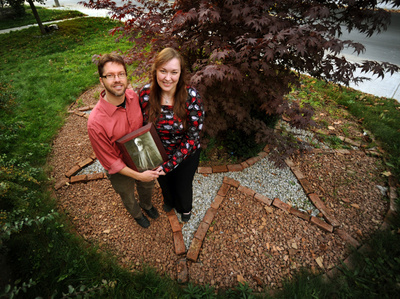
|
|
Abstract: Profile of Dharlene and Sheldon Valeda, and the Bahá'ís of Kitchener, Ontario. Notes: See also Dharlene Valeda's Organizing Digital Collections: The Case of the Bahá'í Academics Resource Library and a photo of her delivering the presentation. Mirrored from www.therecord.com/living/faith/article/609577--baha-i-a-religion-of-unity-and-peace. |
Baha'i a religion of unity and peace
by Liz Monteiro
published in The RecordKitchener, Ontario: 2011-10-14
 Bahai couple Sheldon and Dharlene Valeda stand inside a nine-point star garden on the front lawn of their Kitchener home. They are holding a picture of Abdu'l-Bahá, son of Bahá'u'lláh, the founder of the Bahá'í faith. The star is an important symbol in the religion. David Bebee/Record staff |
Dharlene wears a necklace with a nine-pointed star inside in a circle. Sheldon has a nine-pointed star ring. In Arabic numerology, the number nine represents the word Baha and means “glory.”
The Valedas are practitioners of the Baha’i faith. The grassroots religion practises in people’s homes, although it has shrines around the world. The North American Baha’i house of worship is located near Chicago.
The Baha’i faith was founded by the prophet Baha’u’llah, a Persian noble who lived from 1817 to 1892. He left a life of comfort and faced many years of persecution and imprisonment because he said he was a messenger of God.
The faith started in 1844 with a man known as the Bab, which means “gate” in Arabic, who foretold that Baha’u’llah would soon profess the faith.
Baha’u’llah left many prayers and writings on the faith and appointed his eldest son, Abdu’l-Baha, to lead the faith. He played a key role in expanding the religion worldwide. Abdu’l-Baha’s grandson, Shoghi Effendi, became the guardian of the faith after Abdu’l-Baha’s death.
For Dharlene Valeda, being a Baha’i means feeling a love for Baha’u’llah, but also a great reverence for past prophets such as Jesus Christ and Muhammad.
Following Baha’u’llah doesn’t mean rejecting the other prophets, she said. The previous prophets were important because of their revelations, she said.
“I get more and more committed because it seems like truth," said Sheldon, a high school physics teacher. “You could never go back to thinking the Earth is flat. You can’t go back."
Dharlene said she’s attracted to the Baha’i faith because the religion focuses on unity, humanity and advancing civilization.
“The work of the Baha’i community is an investment in the future," said Dharlene, a librarian.
Dharlene was first introduced to the Baha’i faith when, at age 11, she met a Baha’i family. She became curious about the religion four years later when she learned of Iranian Baha’is being persecuted because of their religious beliefs. One particular story, of a 16-year-old girl who was killed because of her faith, resonated with her. Dharlene’s parents, who attended Anglican and United church services, questioned the Baha’i faith, wondering if it was a cult.
That’s when she immersed herself in reading about the Baha’i faith and her research hasn’t stopped. The couple has numerous books on Baha’u’llah’s writings, Baha’i-related literature and prayer books in their home.
Sheldon became aware of the Baha’i faith when at 18, he dated a young woman whose family was Baha’i. At the time, the religion seemed exotic and strange, he admits.
Years later while in university, Sheldon met Dharlene, who was a practising Baha’i. He then began to read more about the faith.
As a fourth-year physics student and an atheist, Sheldon said he struggled with the concept of God but was attracted to the foundational principles of the Baha’i faith.
Sheldon, who was born and raised Roman Catholic, said he had an “epiphany” when he went camping with his books while on a student exchange in Germany. One morning he awoke to a beautiful day near a lake and was convinced that the beauty he was seeing had to have been created by a greater power.
Unlike other world religions, the Baha’i faith has no clergy. Instead, Baha’is are organized into nine-member spiritual assemblies that oversee Baha’is in a specific geographic location.
In Waterloo Region, there are four assemblies — in Kitchener, Waterloo, Cambridge and Ayr. There are about 285 Baha’is in Kitchener, and about 200 in Waterloo.
The Universal House of Justice, a body based in Haifa, Israel, guides Baha’i activities around the world.
The Baha’i calendar consists of 19 months and every 19 days a “feast” is held. The feast consists of three parts: spiritual prayers, administrative duties followed by a social gathering and meal.
To make the gatherings smaller, some of the feasts are decentralized and neighbourhoods get together rather than the entire assembly, Dharlene said.
Devotional gatherings, which are open to anyone of any faith, are also held in people’s homes. Another important component of the religion is the moral education of youth, with children’s classes, youth groups and study circles for adults.
Baha’is have an obligatory prayer each day that must be said facing in the direction of the burial place of Baha’u’llah which is near Haifa.
For more information on the Baha’i faith, go to http://www.bahai.org/. For information on local events, send an email to bahaikitchener@gmail.com
Bahá'í beliefs
- There is only one God and the world’s religions represent one eternal faith.
- God sends his guidance and love through manifestations which have been progressive, starting with Abraham, Krishna, Moses, Buddha, Zoroaster, Jesus Christ and Muhammad. Baha’u’llah was the most recent manifestation and Baha’is follow his guidance.
- Another manifestation, or prophet, will come to Earth.
- Humanity is one race, destined to live in peace. The kingdom of God will come to Earth.
- Equality of men and women and full racial integration.
- Universal education for everyone.
- Harmony between science and spirituality.
The faith has nine holy days throughout the year. Oct. 20 marks the birth of the Bab.
|
|